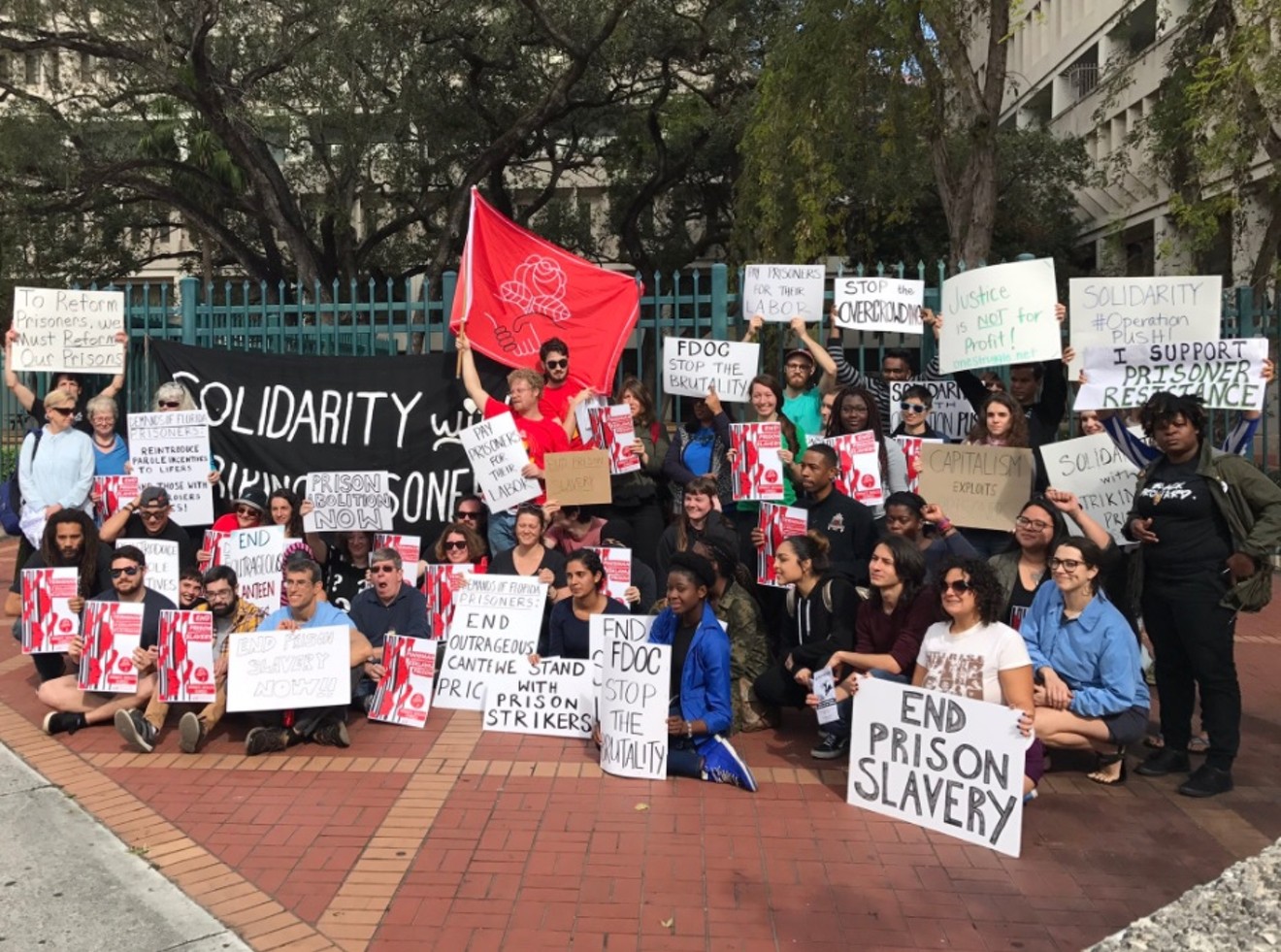When a series of disturbances and insurrections erupted across state prisons nationwide in 2016 on the anniversary of New York's 1971 Attica prison riots, the Florida Department of Corrections (FDOC) danced around acknowledging whether a set of incidents that had occurred in the Sunshine State were related to the nationwide movement.
They were.
But after Florida prisoners announced #OperationPUSH, a monthlong work stoppage beginning on Martin Luther King Jr.
Activists both online and speaking to New Times
"We're finding out now that over the past several weeks, they've been pulling any organizers they can ID and either relocating them or putting them in 'close-management' units, which is the equivalent of solitary confinement," Panagioti Tsolkas, an activist with the Campaign to Fight Toxic Prisons, one of the groups promoting the protest, told New Times yesterday evening. "There have also been shakedowns to take peoples' independent means of communications, like any networks of cell phones on the inside."
In response, a spokesperson for the Florida Department of Corrections, Ashley Cook, said this morning that the activists' statements were "absolutely not true. No Florida inmates participated in work stoppages. All daily operations are continuing as normal, including inmate phone privileges."
But those communicating with prisoners disagree. Tsolkas said the groups he's coordinated with mostly
"Generally, yes, there have been incidents," he said, "but they've been overshadowed so far by the preemptive retaliation. They've also brought in scab labor in the form of other prisoners who aren't aware of the strike." He added that some inmates have reported that FDOC officials have offered better meals to inmates who agree not to strike and that other inmates have been accused of disciplinary infractions already.
Another group promoting #OperationPUSH, the Incarcerated Workers Organizing Committee (IWOC), of the labor union Industrial Workers of the World, shared similar stories on Twitter yesterday.
"The number is now in the dozens of suspected organizers who were placed in solitary as much as two weeks before MLK Day," the IWOC wrote. "We will be sending out specific support requests as we learn of specific charges."
The Miami Herald broke news in December about plans for #OperationPUSH — investigative reporters including Julie K. Brown and Carol Marbin Miller have uncovered an unconscionably huge list of unexplained deaths, beatings, and rights violations in the state prison system, which is the third-largest in America. The majority of state inmates are serving time for nonviolent drug offenses.
The strike, announced in late December, aims to force corrections officials to pay prison laborers a fair wage for what is basically forced work inside FDOC facilities. In written statements to the media, the strikers have also demanded increased access to parole, cheaper and more reasonable prices for basic food and hygiene items, voting rights for former felons, and an end to prison-guard brutality.The number is now in the dozens of suspected organizers who were placed in solitary as much as two weeks before MLK Day. We will be sending out specific support requests as we learn of specific charges. #OperationPUSH
— IWOC (@IWW_IWOC) January 18, 2018
"Our goal is to make the Governor realize that it will cost the state of Florida millions of dollars daily to contract outside companies to come and cook, clean, and handle the maintenance," the organizers wrote before the strike began. "This will cause a total BREAK DOWN."
News has trickled out slowly from inside the system since Monday, but multiple protests and solidarity marches have occurred throughout the state. One was held at FDOC offices in downtown Miami this past Monday and another in Tallahassee the following day. A 19-year-old activist was arrested at the state capital demonstration after police say she broke some glass.Despite some reports, FL inmates did NOT participate in a strike. All daily operations have continued statewide. To learn more about our institutions, visit: https://t.co/YDwbsyCm3u
— FL Dept. Corrections (@FL_Corrections) January 18, 2018
For those who want to support the strikers, organizers have set up a "phone zap" to call the FDOC and ask it to agree to the operation's demands.
More than 135 civil rights and activist groups, including local chapters of the National Association for the Advancement of Colored People and the Florida Women's March, have voiced their support for #OperationPUSH. At a speech at Florida State University, civil rights icon Angela Davis said there is "no better way to keep the legacy of Dr. King alive than by supporting the prisoners' strike."#OperationPUSH PHONE ZAP MONDAY Jan 22
— IWOC (@IWW_IWOC) January 18, 2018
Dozens of prison strikers are being held in solitary. It's time to put the FDC on notice that there is a nationwide movement behind them.
Retweet if you or your organization plans on joining. #SolidarityWithPUSH pic.twitter.com/v0ifBzYvV5
Update: Prison-rights groups have since released the following, detailed message to the public:












